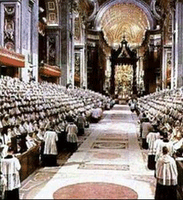Lumen Gentium 22
 Two parts to this section; first a reiteration of the role of bishops as successors to the apostles:
Two parts to this section; first a reiteration of the role of bishops as successors to the apostles:
Just as in the Gospel, the Lord so disposing, St. Peter and the other apostles constitute one apostolic college, so in a similar way the Roman Pontiff, the successor of Peter, and the bishops, the successors of the apostles, are joined together. Indeed, the very ancient practice whereby bishops duly established in all parts of the world were in communion with one another and with the Bishop of Rome in a bond of unity, charity and peace,(Cfr. Eusebius, Hist. ecl., V, 24, 10: GCS II, 1, p. 49S; cd. Bardy, Sources Chr. II, p. 69 Dionysius, apud Eusebium, ib. VII 5, 2: GCS 11, 2, p. 638 s.; Bardy, II, p. 168 s.) and also the councils assembled together,(Cfr. de antiquis Conciliis, Eusebius, Hist. Eccl. V, 23-24: GCS 11, 1, p. 488 ss.; Bardy, 11, p. 66 ss. et. passim. Conc. Nicaenum. Can. S: Conc. Oec. Decr. p. 7.) in which more profound issues were settled in common, (Tertullianus, de Iciunio, 13: PL 2, 972 B; CSFL 20, p. 292,lin. 13-16.) the opinion of the many having been prudently considered,(S. Cyprianus, Epist. 56, 3: Hartel, 111 B, p. 650; Bayard, p.154.) both of these factors are already an indication of the collegiate character and aspect of the episcopal order; and the ecumenical councils held in the course of centuries are also manifest proof of that same character. And it is intimated also in the practice, introduced in ancient times, of summoning several bishops to take part in the elevation of the newly elected to the ministry of the high priesthood. Hence, one is constituted a member of the episcopal body in virtue of sacramental consecration and hierarchical communion with the head and members of the body.
... and the role of the pope:
But the college or body of bishops has no authority unless it is understood together with the Roman Pontiff, the successor of Peter as its head. The pope's power of primacy over all, both pastors and faithful, remains whole and intact. In virtue of his office, that is as Vicar of Christ and pastor of the whole Church, the Roman Pontiff has full, supreme and universal power over the Church. And he is always free to exercise this power. The order of bishops, which succeeds to the college of apostles and gives this apostolic body continued existence, is also the subject of supreme and full power over the universal Church, provided we understand this body together with its head the Roman Pontiff and never without this head.(Cfr. Relatio officialis Zinelli, in Conc. Vat. I: Mansi S2,1 109 C.) This power can be exercised only with the consent of the Roman Pontiff. For our Lord placed Simon alone as the rock and the bearer of the keys of the Church,(Cf. Mt. 16, 18-19) and made him shepherd of the whole flock;(Cf. Jn. 21, 15 ff) it is evident, however, that the power of binding and loosing, which was given to Peter,(Mt. 16, 19) was granted also to the college of apostles, joined with their head.(Mt. 18, 18; 28, 16-20)(Cfr. Conc. Vat. 1, Schema Const. dogm. 11, de Ecclesia Christi, c. 4: Mansi S3, 310. Cfr. Relatio Kleutgen de Schemate reformato: Mansi S3, 321 B - 322 B et declaratio Zinelli: Mansi 52 1110 A. Vide etiam S. Leonem M. Scrm. 4, 3: PL 54, 151 A.) This college, insofar as it is composed of many, expresses the variety and universality of the People of God, but insofar as it is assembled under one head, it expresses the unity of the flock of Christ. In it, the bishops, faithfully recognizing the primacy and pre-eminence of their head, exercise their own authority for the good of their own faithful, and indeed of the whole Church, the Holy Spirit supporting its organic structure and harmony with moderation. The supreme power in the universal Church, which this college enjoys, is exercised in a solemn way in an ecumenical council. A council is never ecumenical unless it is confirmed or at least accepted as such by the successor of Peter; and it is prerogative of the Roman Pontiff to convoke these councils, to preside over them and to confirm them.(Cfr. Cod. Iur. Can., c. 227.) This same collegiate power can be exercised together with the pope by the bishops living in all parts of the world, provided that the head of the college calls them to collegiate action, or at least approves of or freely accepts the united action of the scattered bishops, so that it is thereby made a collegiate act.
I know we have a few Eastern Christians or Orthodox-leaning folks in the readership. How do you read part 22?
# posted by Todd @ 9/04/2006 09:10:00 PM
 Two parts to this section; first a reiteration of the role of bishops as successors to the apostles:
Two parts to this section; first a reiteration of the role of bishops as successors to the apostles: